

Index. Star Wars: A galaxis építése kóddal. A Simple Trick for Success with One-Pagers. 5 Hacks for “Taskifying” the Coursebook. After a bit of a longer COVID chaos-enforced hiatus than I would have liked, this guest post is from Neil Anderson.
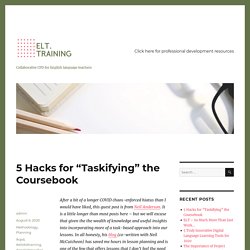
It is a little longer than most posts here – but we will excuse that given the the wealth of knowledge and useful insights into incorporating more of a task-based approach into our lessons. In all honesty, his blog (co-written with Neil McCutcheon) has saved me hours in lesson planning and is one of the few that offers lessons that I don’t feel the need to tweak! Is there a case against coursebooks? You could be forgiven for feeling that discussion of coursebooks – their pros and in particular their cons – has been done to death in recent years.
It’s not, though, a topic that will disappear so long as we continue to use them as the basis of our language courses, whether in private language schools or primary / secondary education. Synthetic Syllabuses This is familiar, well-established and comfortable for teachers and learners. Current trends in ELT (UK) Around 25 years ago, when I worked at International House London, I used to teach a course called ‘Current Trends in ELT’.
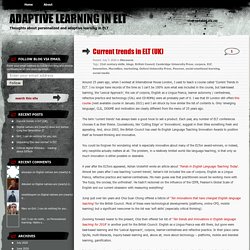
I no longer have records of the time so I can’t be 100% sure what was included in the course, but task-based learning, the ‘Lexical Approach’, the use of corpora, English as a Lingua Franca, learner autonomy / centredness, reflective practice and technology (CALL and CD-ROMs) were all probably part of it. I see that IH London still offers this course (next available course in January 2021) and I am struck by how similar the list of contents is. Only ‘emerging language’, CLIL, DOGME and motivation are clearly different from the menu of 25 years ago. The term ‘current trends’ has always been a good hook to sell a product. Each year, any number of ELT conferences chooses it as their theme.
You could be forgiven for wondering what is especially innovative about many of the ELTon award-winners, or indeed, why neophilia actually matters at all. Pearson English blog Related. World of Better Learning. Blogs & Articles. Oxford University Press - English Language Teaching Global Blog. Pearson English. Teaching Vocabulary through Context and Examples: "3-2-1 Go!" What happens after the story? – Cécile Lainé. As a teacher who loves using Story Listening and Reading to facilitate language acquisition, the question I get asked the most is: “What happens after the story?”
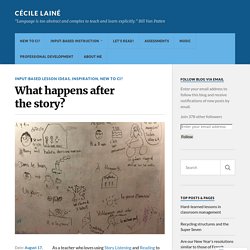
I am excited to provide a response in this post. Ready? Nothing has to happen after the story. The heart of Story Listening and Reading is that the story itself, if compelling and comprehensible, is enough. 10 Activities using Dice for ESL/EFL Students - Teacher's Pit Stop. About the Sustainable Development Goals - United Nations Sustainable Development.
Szabad Iskolákért Alapítvány. Psychology for Educators [And More] Research Findings on Studying Effectively Six Key Principles: As teachers, our job is to help students study English more effectively.
![Psychology for Educators [And More]](http://cdn.pearltrees.com/s/pic/th/principles-psychology-136434792)
And generally, we are good at it. We know which language forms they should study first, which vocabulary items they should focus on, etc. Zooming in and Zooming out. A while back I saw a pretty impressive video on youtube and since then the images from it keep filling my head.
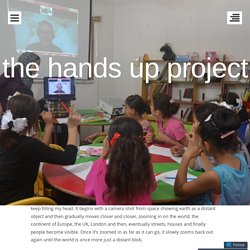
It begins with a camera shot from space showing earth as a distant object and then gradually moves closer and closer, zooming in on the world, the continent of Europe, the UK, London and then, eventually streets, houses and finally people become visible. Vocabulary. 10 commonly made mistakes in vocabulary instruction. Please note: this post was written in collaboration with Steve Smith of and Dylan Vinales of Garden International School.
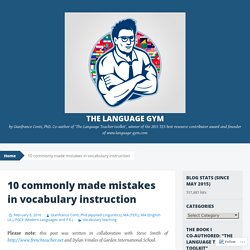
13 steps to successful vocabulary teaching. The following are the principles that underpin vocabulary teaching in my everyday practice.
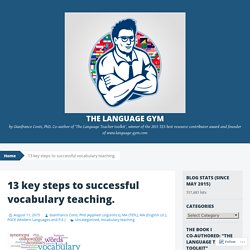
The reader may want to refer to my article ” How the human brain stores and organizes vocabulary and implications for the EFL/MFL classroom” for the theoretical background to my approach. The writing skill most foreign language teachers don’t teach: interactional writing. 1.What is writership?

Chatting online or texting via SMS, WATSAPP, etc. has become part and parcel of our daily life, the verb and noun ‘chat’ alluding to the fact that although we are writing we are in fact ‘talking’ to someone. Just like in a face-to-face conversation when chatting online we have to respond to our interlocutor in real time if we want to ‘stay’ in the conversation and, most importantly, if we want to keep him or her engaged.
Since in real-life face-to-face communication applied linguists refer to interactional listening as ‘Listenership’ I will henceforth call the set of skills involved in interactional writing: ‘Writership’. Listenership and Writership have many similarities in terms of the cognitive processes they involve. There are, however, important differences, too. 2. Nine research facts about L2 phonology teaching and learning that every teacher should know. 1.
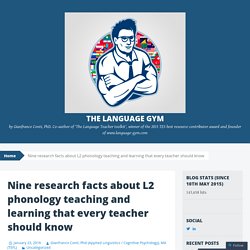
Introduction. How To Prepare Students For 21st Century Survival. 7 Skills Students Will Always Need by Jennifer Rita Nichols Ed note: This post has been updated from a 2013 post.
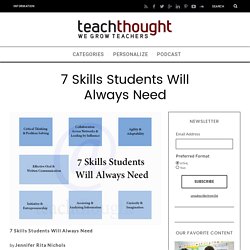
As educators, we constantly strive to prepare our students for the ‘real world’ that exists around them. IATEFL-Hungary blog. Watch our Budapest Online 2015 recorded sessions below Budapest Online 2015 livestreamed sessions 11.30-12.15 Uwe Pohl and Margit SzesztayTeaching English with the three CsDownload session slides Watch recorded session here In this workshop we will explore how teachers can bring creative, critical and compassionate thinking into their language classrooms.
Web 2.0-s eszközök gyűjteménye 2. változat - Google Sheets. Teaching with TIC. Richards-Beyond-Plateau.pdf. Reaching a Plateau in Language Learning – How to Get Out of It? There is probably nothing as frustrating as putting a hell of a lot of amount of work, and not feeling like you’re making any progress. Sadly, though, this situation happens to a lot of language learners, and it often becomes a dominant factor in people’s decision to stop learning a foreign language halfway through their goals.
This is what we commonly call “reaching a plateau”. So why does it happen, and how can we avoid it, or at least, get out of it? Routine, and Reaching the Autonomous Stage Dr. TEDx. Last year I spoke at TEDx, an independently organized TED event, about my strategy of Speaking From Day 1. This video introduces some of the concepts I explain in more detail in my international best selling book, Fluent in 3 Months.
How to get over a plateau stopping you from making progress: how I’m doing it with my Chinese. One of the biggest questions I get asked by people already deep into their language learning project relates to how they should get over the plateau they are stuck in. There are many different types of plateaux you could be looking at. Maybe you have learned some basic vocab but can’t muster up the courage to use it with people? Maybe you’re already talking but can’t get past speaking more than a few words? Maybe you are actually speaking, but stuck at a certain level of conversation with lots of mistakes?
Creating a Caring Classroom. Creating a Caring Classroom starts on the very first day of school. I think the most important thing a teacher can do that first week is to establish a warm and caring atmosphere in his or her classroom. You'll need to build an atmosphere of trust, where students can feel free to be themselves without worrying that classmates will make fun of them. At the same time, you'll want to establish clear expectations for acceptable behavior right from the very beginning. Authentic video in the classroom: Ireland II. A perfect listening lesson. How to Start a Great Writing Center. As a high school student at Brimmer and May, an independent school in Chestnut Hill, Massachusetts, I spent many helpful hours in the writing center.
Rather than line edit my work with the all-intimidating "red pen" (a badge of honor for many teachers), talented staff members posed deep, prodding questions to help me realize how I could improve my prose, structure, and analysis. Please, I need you to participate… 5 Ways to Make Class Discussions More Exciting. Classroom discussions have been a staple of teaching forever, beginning with Socrates. I have taught using discussions, been a student in discussions, and observed other teachers' discussions thousands of times -- at least.
8 Strategies for Teaching Academic Language. 50 "Best Practices" for language teachers. 50 “Best Practices” For Language Teachers. IKT műhely. 50 Google Docs Tips Every Teacher should Know about. Teacher Training Presentations. Literacy Work Station Ideas. 8 Idioms to tell someone to “shhh” or be quiet. Learn Real English » 7 Rules Signup Page [WiderFunnel winning variation]